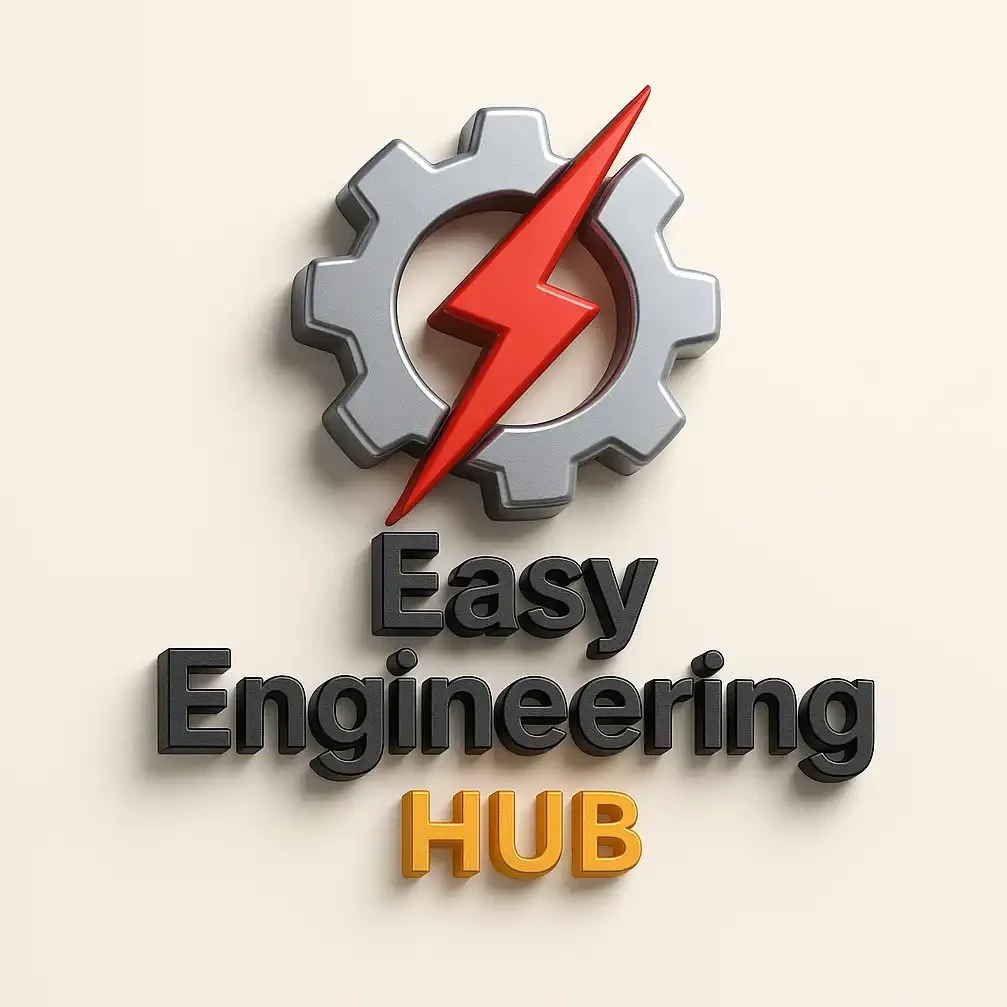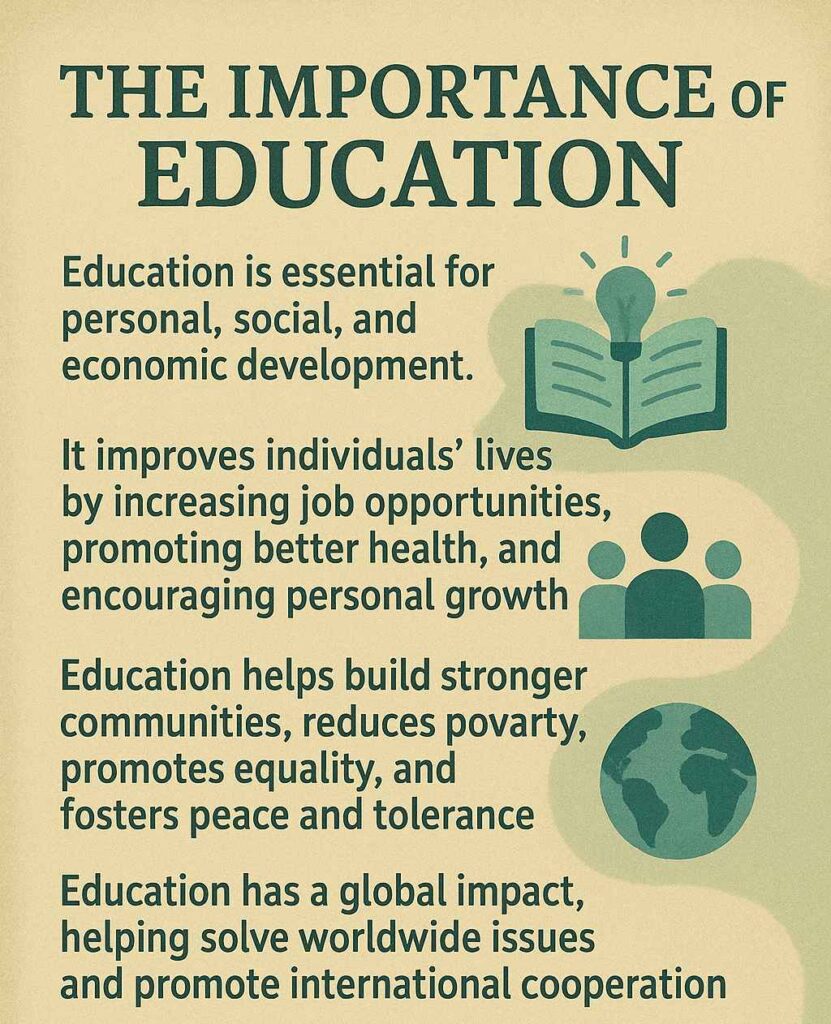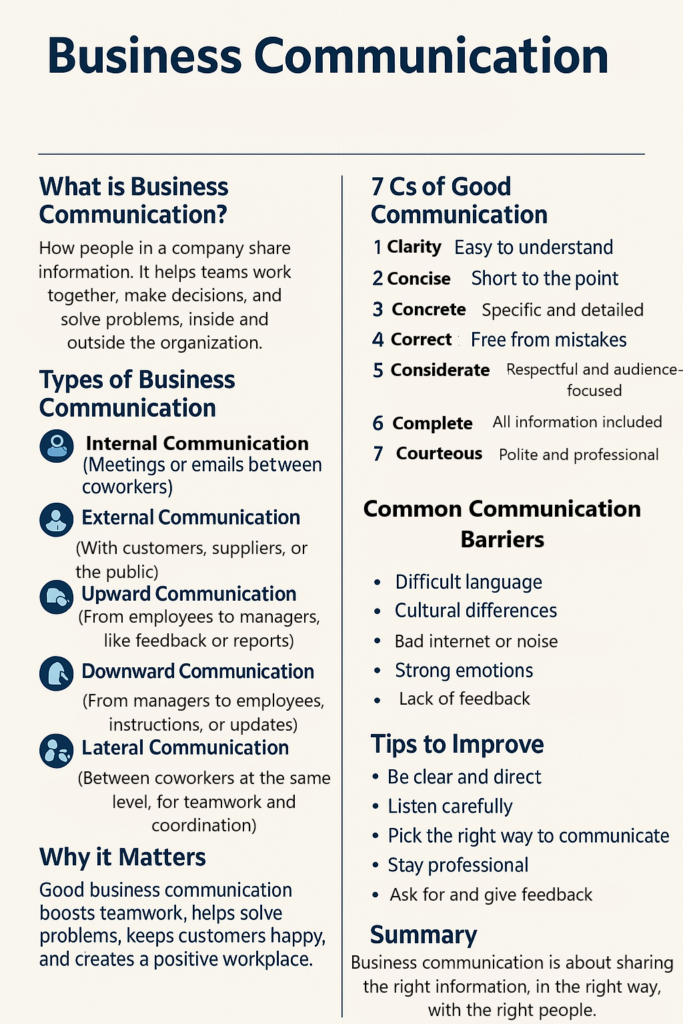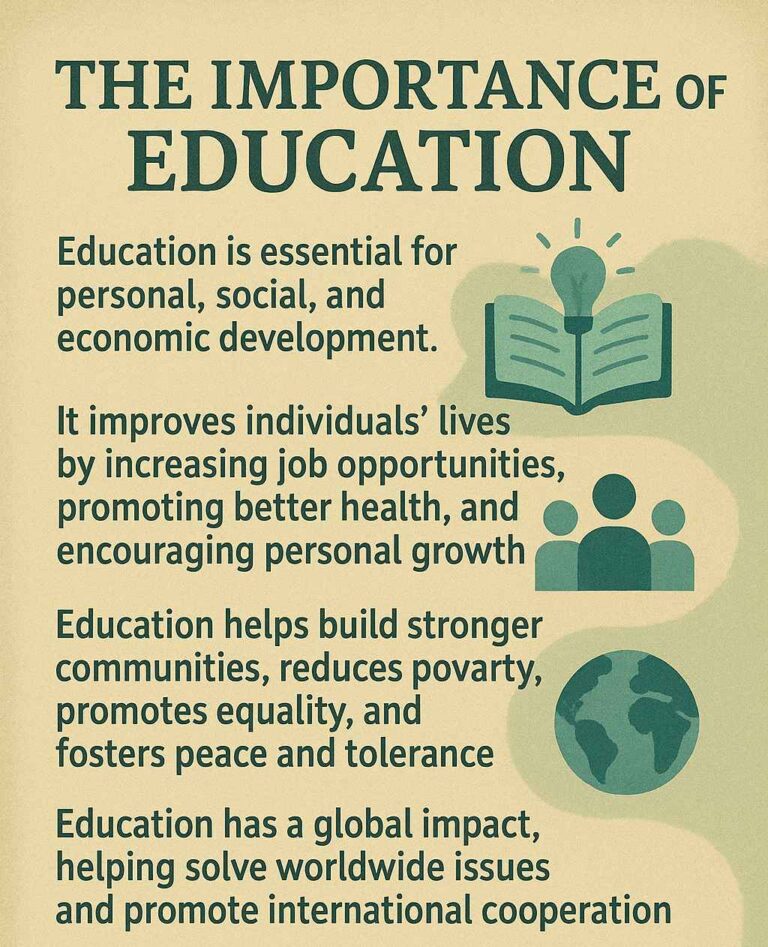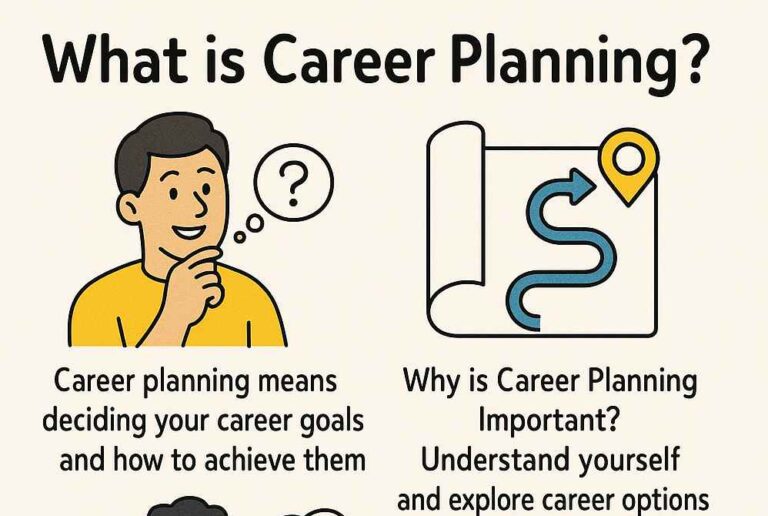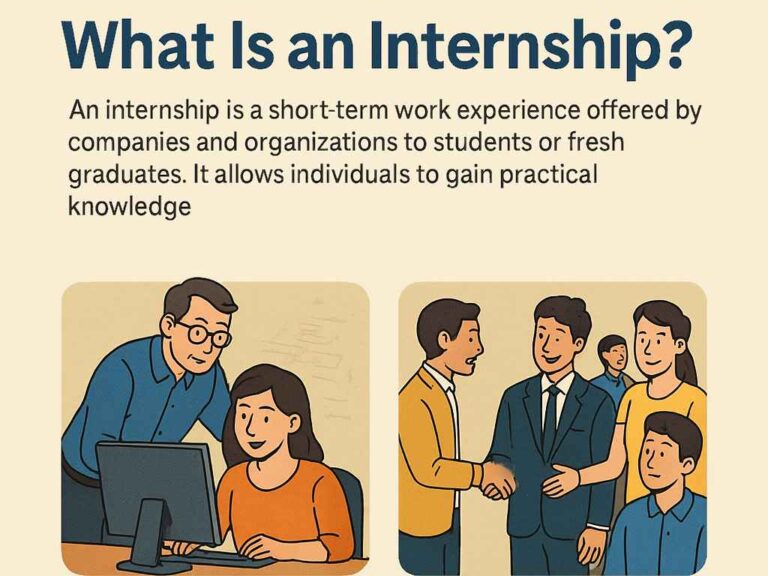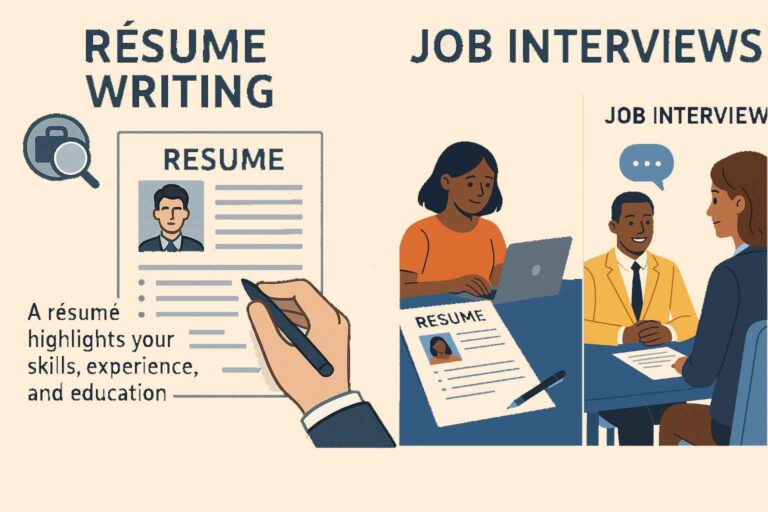Resume Writing and Job Interviews
Part 1: Resume Writing
A resume is a document that lists your skills, education, experience, and other important information to show why you’re a good candidate for a job. It’s often the first impression an employer gets of you, so it needs to be well-organized, clear, and focused.
1. What is a Resume?
A resume is your personal marketing tool. It highlights your qualifications and experiences to show potential employers that you have the skills needed for a job. A good resume should be easy to read and tailored for the specific position you’re applying for.
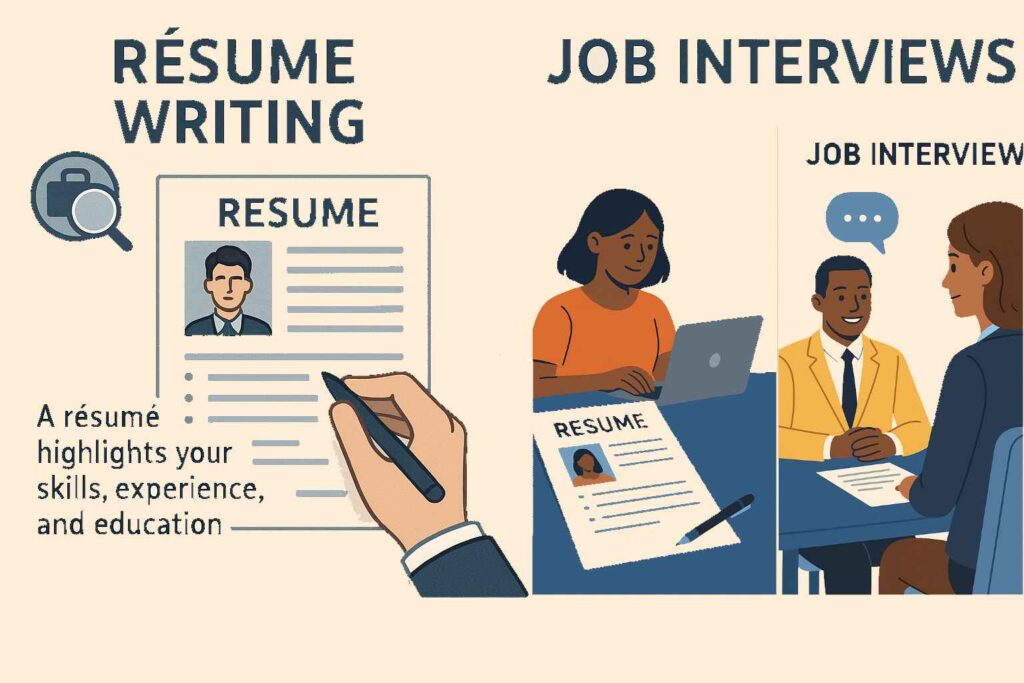
2. Key Sections of a Resume
Here are the main sections that every resume should have:
1. Contact Information
At the top of your resume, you should include:
- Your full name
- Phone number
- Email address (make sure it’s professional)
- LinkedIn profile (if you have one, or other professional sites like a portfolio or GitHub for tech jobs)
2. Objective or Summary (Optional)
Some people include a short statement about what they want to achieve in their career, like:
“Motivated and hard-working individual seeking a marketing role where I can apply my creativity and strong communication skills.”
This is optional but can give employers a quick understanding of your goals.
3. Skills
List any skills you have that are relevant to the job. Skills could include:
- Technical skills (like programming languages or tools you can use)
- Soft skills (like communication, teamwork, or leadership)
- Language skills (if you speak more than one language)
4. Work Experience
This is one of the most important sections. Include any jobs or internships you’ve had, along with:
- Job title
- Company name
- Dates of employment
- Key responsibilities and achievements
For example: Marketing Intern, ABC Corp (June 2023 – August 2023)
- Created social media content that increased followers by 25%.
- Assisted in organizing marketing campaigns and events.
5. Education
List your educational qualifications:
- Degree (e.g., Bachelor’s in Computer Science)
- School/University
- Graduation date
- Include any certifications or special courses that relate to the job you’re applying for.
6. Additional Sections
You might also want to include:
- Volunteer work
- Awards or honors
- Hobbies (if they are relevant to the job)
3. Resume Writing Tips
- Keep it concise: Ideally, a resume should be 1 page long (especially for entry-level jobs) or up to 2 pages for more experienced candidates.
- Use bullet points to list your achievements and responsibilities for easy reading.
- Tailor your resume: Customize your resume for each job by emphasizing the skills and experience that match the job description.
- Be honest: Don’t exaggerate or lie about your experience. Employers will check your references.
- Proofread: Make sure your resume has no spelling or grammatical errors. A mistake can make you look unprofessional.
Part 2: Job Interviews
Once your resume grabs the employer’s attention, the next step is usually the job interview. A job interview is a conversation where an employer learns more about you and decides if you’re a good fit for the role.
1. What is a Job Interview?
A job interview is a formal meeting between you (the candidate) and a potential employer. The purpose of the interview is for the employer to get to know you better, understand your qualifications, and see if you match the company’s needs and culture.
2. Types of Job Interviews
1. In-person Interviews
- Traditional face-to-face interviews, where you meet with the hiring manager or HR representative in person.
2. Phone Interviews
- Often used as the first step. The employer will call you to ask a few questions about your qualifications and decide if they want to move forward with you.
3. Video Interviews
- Conducted via platforms like Zoom or Skype. They have become more common, especially for remote positions or initial interviews.
4. Panel Interviews
- A group of people (such as several managers or team members) interview you at the same time. They may each ask questions related to their department or role.
3. How to Prepare for a Job Interview
1. Research the Company
Before the interview, learn about the company’s:
- Mission and values
- Products or services
- Recent achievements or news about the company
This shows the employer that you are genuinely interested in the company and the role.
2. Practice Common Interview Questions
Some common questions you might be asked include:
- Tell me about yourself.
- Keep your answer brief and relevant. Focus on your skills, experience, and career goals.
- Why do you want to work here?
- Mention something specific about the company, such as their culture or their products.
- What are your strengths and weaknesses?
- Talk about strengths that are relevant to the job and weaknesses that you are working to improve.
- Where do you see yourself in five years?
- Discuss your career goals and how the position aligns with them.
3. Prepare Your Questions
At the end of the interview, you’ll likely be asked if you have any questions. Be prepared to ask:
- What does a typical day look like in this role?
- What are the opportunities for growth and development within the company?
- What is the company culture like?
4. Dress Appropriately
Dress in a way that is professional but also suitable for the job you’re applying for. In many industries, business casual is a safe bet, but for some roles, more formal attire might be required.
5. Practice Good Body Language
- Smile and make eye contact to show that you are engaged.
- Sit up straight and avoid crossing your arms to appear open and confident.
- Shake hands firmly when you greet and leave the interviewer.
4. What to Do During the Interview
- Be confident, but not arrogant: Show that you believe in your abilities but remain humble.
- Listen carefully: Don’t rush to answer. Take a moment to understand the question before responding.
- Be clear and concise: Avoid rambling. Answer the question directly and back it up with examples from your experience.
- Stay positive: If asked about a past job or experience that didn’t go well, focus on what you learned from it and how you grew as a result.
5. What to Do After the Interview
- Follow-up with a thank-you note: Send a polite thank-you email within 24 hours of the interview. Mention specific parts of the conversation that you enjoyed or found interesting and reaffirm your enthusiasm for the role.
Summary
Resume writing and job interviews are two key components of the job application process. A resume is a personal document that highlights your skills, experience, and education to show potential employers that you’re a strong candidate. It should be clear, concise, and tailored for each specific job. Job interviews are conversations where employers learn more about you and determine if you’re a good fit for their team. Preparation is key: researching the company, practicing common interview questions, dressing appropriately, and showing confidence will help you succeed. After the interview, always follow up with a thank-you note to express your appreciation and keep the connection strong. With the right preparation, you can increase your chances of landing the job you want.
